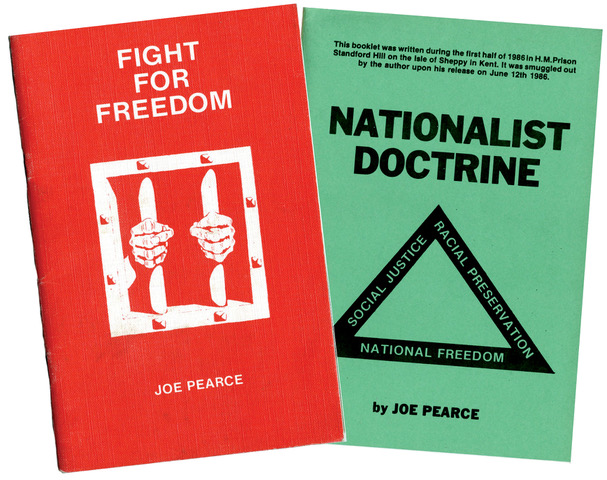
Introduction
These booklets are of twofold significance: first for showing the direction of political thinking of the youth wing of the National Front in the 1980s (then the largest ethnic nationalist movement in Britain); secondly for giving a revealing insight into the development of someone who has become a globally significant writer in his chosen field of literary Catholicism.
To fully appreciate the significance of these booklets one has to understand the circumstances from which they sprang.
In the early 1980s Joe Pearce was one of the leaders of the Young National Front and edited Nationalism Today, the self-styled 'Radical Voice of British Nationalism'. Whilst still in his teens, he was appalled by what he saw as Nationalist appeasement to the creeping censorship on racial matters imposed by the British establishment, via sundry 'Race Relations' Acts. He decided to fight the establishment head-on, by writing 'Bulldog' – a deliberately provocative publication which flouted the laws of the time. The inevitable consequence was that he was given six months imprisonment in 1982, even though the prosecution admitted that all the factual statements made in Bulldog were true: one simply was not permitted to say them under the Race Relations Act. In hindsight it could be argued that Bulldog was politically counter-productive and a strategic blunder; however nobody can question the author's commitment and courage.
Fight For Freedom was written in Chelmsford prison while the author was 20 years old. It has both the strengths and weaknesses that one might expect in a short booklet written under these circumstances. Its strength lies in its sincerity and breadth of vision of an alternative Britain. Its weakness lies in its youthful disdain for all the practical problems that lie in the way of achieving that vision. The lack of research facilities in prison cannot have helped either!
In 1986 Joe Pearce was back in prison for continuing to produce Bulldog – this time receiving a 12 month sentence. Again he tried to put his time in gaol to good use by continuing to write, but a lot had changed in the four years since his first conviction.
Essentially Joe Pearce had discovered religion – specifically Roman Catholicism, primarily due to his readings of GK Chesterton. He had been impressed by reading Catholic catechisms and sought to produce a concise booklet that would be useful in educating young Nationalists in the fundamentals of the cause, hence Nationalist Doctrine. As the author saw it these fundamentals were Social Justice, Racial Preservation and National Freedom.
A second change was in the fate of the National Front: when he had completed his first sentence he rejoined a united party that was invigorated by his release. Things were to be different the second time around. In 1986, taking advantage of Joe's absence, a small group of people within the party, admirers of – bizarrely – Col. Gaddafi, caused massive disruption and demoralisation. A limited edition of Nationalist Doctrine was printed, but organisational disarray meant that few young Nationalists ever got the chance to read it.
Understandably Joe Pearce was disillusioned that the sacrifices of his liberty had been wasted, and by 1988 he had taken leave of party politics. His steadily growing religious convictions led to him being formally received into the Catholic Church, in March 1989. He then embarked on a different journey – principally as the biographer of literary figures who had been deeply influenced by their Catholicism.
Moving to the USA, Joseph Pearce – as he now styled himself – obtained a position at a Catholic university, and became editor of a Catholic periodical, the St Austin Review. When Pearce met Alexander Solzhenitzyn the great Russian writer told him how much he, Solzhenitzyn, had respected Pearce's biography of GK Chesterton. Praise indeed! No less a Catholic than Pope Benedict XVI was an admirer of the St Austin Review, granting it permisison to publish the first English language translation of his essay on 'Catholicity'. As a quick glance at Amazon will reveal there are well over a dozen books by Joseph Pearce in print, published by major, mainstream publishers.
Nobody in 1986 – least of all Joe Pearce himself – could have guessed how successful he would become as a writer. And few today, familiar only with the meticulously-researched volumes written by the Catholic scholar, Joseph Pearce, would guess his genesis as Joe Pearce, the political firebrand.
Perhaps these two modest booklets – Fight For Freedom and Nationalist Doctrine – will help to explain how Joe Pearce became Joseph Pearce.
Fight for Freedom (Joe Pearce)
Nationalist Doctrine (Joe Pearce)